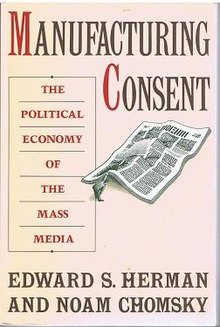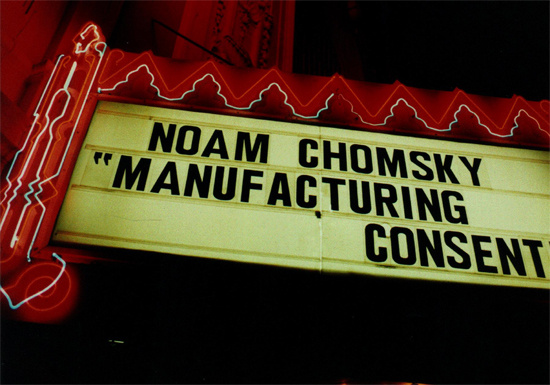
In 1988 Edward S. Herman and Noam Chomsky published the book “Manufacturing Consent: The political economy of Mass Media”. In this book they craft the “Propaganda Model”, which consists of five filters media- particularly media controlled by large corporations (for example the BBC)- may go through.
Mainstream Media is often controlled by the government or larger corporations and so content must be approved by them before it is able to reach the public. For example: news websites can’t just publish any old article- it must be checked by editors to check for any errors or things they may need to omit. The book demonstrates how mass media is often biased or defined by the larger corporations that own it, it’s output is based on what that corporation wants from it and said output will likely distort the truth.
These five filters are:
Most Media outlets are often controlled by companies with agendas- for example certain newspaper companies may portray events in certain ways because it’s what their sponsors, the government or their audience would want. This means news, especially political news, will rarely be reported on in a neutral way.
This theory isn’t exactly black and white though: while plenty of widespread media can fit into these filters it isn’t always guaranteed- it can be argued not every major outlet or reporter is corrupt or controlled and in the modern era there are many more outlets for media to express itself relatively freely- for example social media sites like YouTube.
The propaganda model can exist in many different mediums- so far I have mostly talked about news reporters however it can also be applied to non-news centric Radio and TV shows, product marketing, schools and workplaces etc. For example education systems often withhold information or distort the truth when talking about certain subjects- to add onto this example we can use Section 28, a series of laws that prohibited “promotion of homosexuality” particularly in schools. This example in itself can be subject to the filters of the propaganda model- specifically the “flak” and “common evil” filters.
As an example of ownership: the BBC has ownership of a large amount of media channels in the UK in all different mediums. This is a prime example as they control what is and what isn’t able to be presented on a large majority of UK Televisions, Radio etc. This would allow them- if they wanted- to manipulate these different channels into promoting specific content they require.
The BBC also have control over advertising and funding– many BBC owned streaming services don’t allow for advertisements as they already earn money through TV Licensing, which is a whole other control issue in itself, and so allows them to obscure certain things from their viewers (though not entirely to their detriment, who actually likes ads anyway?)
Many people in the UK also have the BBC as their primary source for entertainment and news, meaning the BBC has a good grasp over the content the majority of UK viewers watch.
The propaganda model can assist us in how we perceive and criticise the media we consume- whether it be mundane entertainment or serious news.
Source List:
Manufacturing Consent: The Political Economy of the Mass Media – Edward S. Herman and Noam Chomsky
Article – https://misinforeview.hks.harvard.edu/article/propaganda-misinformation-and-histories-of-media-techniques/
Article – https://reutersinstitute.politics.ox.ac.uk/news/bbc-under-scrutiny-heres-what-research-tells-about-its-role-uk


The article on “Manufacturing Consent” effectively highlights the subtle control of mass media, illustrating how it shapes public perception to align with elite interests. It underscores the importance of recognizing and challenging these influences for a more informed and independent public discourse.
The blog’s elaboration of the five filters of ownership, advertising, sources, bashing and ‘anti-communism’ or ‘common evil’ gave me a clear understanding of how the mass media, especially entities like the BBC, are affected. The analysis of the BBC’s control over various media outlets and its impact on the distribution of content is very telling. I’m curious about your thoughts on how the “propaganda model” applies to emerging media platforms such as social media. Furthermore, how can individuals guide media consumption in an environment dominated by corporate interests?